

The Truth About Cholesterol, Part 2: Lowering Your LDL. Why Vitamin C Intake Should Not Be a Primary Focus of Cardiovascular Disease Prevention – The Hammer of Health. A popular theory exists, proposed by respected scientists like Linus Pauling and Matthias Rath, that insufficient vitamin C intake is one of the main factors driving cardiovascular disease.
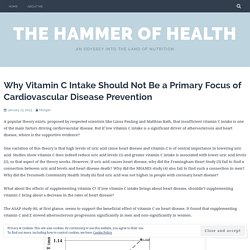
But if low vitamin C intake is a significant driver of atherosclerosis and heart disease, where is the supportive evidence? One variation of this theory is that high levels of uric acid cause heart disease and vitamin C is of central importance in lowering uric acid. Studies show vitamin C does indeed reduce uric acid levels (1) and greater vitamin C intake is associated with lower uric acid levels (2), so that aspect of the theory works. However, if uric acid causes heart disease, why did the Framingham Heart Study (3) fail to find a connection between uric acid levels and heart disease death?
Why did the NHANES study (4) also fail to find such a connection in men? What about the effects of supplementing vitamin C? Sure enough, there is evidence that this is possible. References: Like this:
Vitamin D and Heart Health. Coenzyme Q10/Ubiquinol. The Silent Epidemic of Iodine Deficiency. Novel antioxidant makes old blood vessels seem young again. Vitamin K2, Heart Disease, and Cancer. Emerging evidence indicates that vitamin K2 plays a large role in the prevention of heart disease and cancer, as well as other conditions.
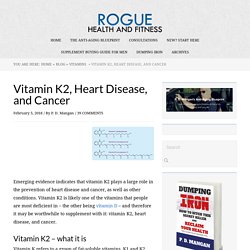
Vitamin K2 is likely one of the vitamins that people are most deficient in – the other being vitamin D – and therefore it may be worthwhile to supplement with it: vitamin K2, heart disease, and cancer. Vitamin K2 – what it is Vitamin K refers to a group of fat-soluble vitamins, K1 and K2. Somewhat confusingly, there are several different forms of K2 as well. Selenium and CoQ10 Combo Cuts Heart Disease Deaths in Half. Five year study reveals that combining selenium with CoQ10 has been found to dramatically slash the risk of death from cardiovascular disease Cardiovascular disease is the leading cause of death in the developed world, killing more than 17 million per year, which is more lives than cancer claims.
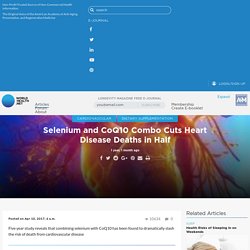
This is due to arterial plaque caused by poor diets, lack of exercise, obesity, and smoking. A remarkable study to come out of Sweden shows that taking two supplements (CoQ10 and selenium) in combination may slash mortality risks by almost 50%. Researchers found that these nutrients may have many benefits including: overall improved heart functionreduction of hospital stays due to surgeriesprotection lasts years after stopping supplements Swedish researchers published the study in the International Journal of Cardiology that revealed the health benefits of CoQ10 and selenium.
A study lasting five years was conducted on 443 healthy adults between the ages of 70 and 80. Taurine Increases Exercise Capacity in Heart Patients. Lutein Demonstrates Potent Circulatory Protection. Lycopene and Lutein Improve Carotid Artery Thickness. Scientists Tout Resveratrol as a Primary Nutrient for Cardio Health. Caprylic Acid Helps Clear Cholesterol. Copper and Cardiovascular Disease. In 1942, Dr.
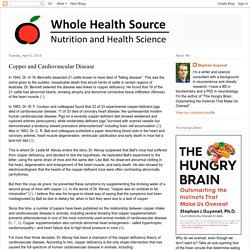
H. W. Bennetts dissected 21 cattle known to have died of "falling disease". This was the name given to the sudden, inexplicable death that struck herds of cattle in certain regions of Australia. Dr. In 1963, Dr. This is where Dr. But then the coup de grace: he prevented these symptoms by supplementing the drinking water of a second group of mice with copper (4). Since this time, a number of papers have been published on the relationship between copper intake and cardiovascular disease in animals, including several showing that copper supplementation prevents atherosclerosis in one of the most commonly used animal models of cardiovascular disease (6, 7, 8).
For more than three decades, Dr. The second reason you may not have heard of the theory is due to a lab assay called copper-mediated LDL oxidation. The third reason you may never have heard of the theory is more problematic. Nutrient status is sometimes a slippery thing to measure. Curcuminoids Improve Lipid Profiles, Reduce CVD Risk in Diabetic Patients. Adding to a growing list of health benefits of turmeric, a new study show that three major compounds found in the plant may help reduce the risk of cardiovascular disease in patients with type 2 diabetes.
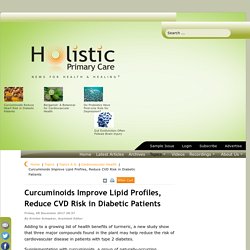
Supplementation with curcuminoids, a group of naturally-occurring substances present in turmeric, reduced lipoprotein(a) [Lp(a)] and increased high-density lipoprotein cholesterol (HDL-C) in a cohort of diabetic patients with dyslipidemia. This could significantly lower the risk of cardiovascular events in dyslipidemic type 2 diabetes patients, the authors argue in a paper published in the journal Complementary Therapies in Medicine. Dr. Yunes Panahi and colleagues at Baqiyatallah University of Medical Sciences in Tehran, Iran, recruited 82 adults aged 18 to 65 years from the Baqiyatallah Hospital Diabetes Clinic. Healthier Lipid Profiles Panahi and colleagues did not observe any significant changes in serum triglycerides or LDL-C related to curcumin consumption. Promising Signals. Pantethine a Safe Option for Patients “On the Cusp” of Cardiac Risk.
Bergamot: A Botanical Alternative for Cardiovascular Health. Astaxanthin: Antioxidant for Protecting Heart, Cholesterol, Mitochondria, and Circulatory Health. Makers of SuperBeets, Neo40, and BeetElite. PQQ: Champion Protector for Heart Health, Mitochondria, Triglycerides.